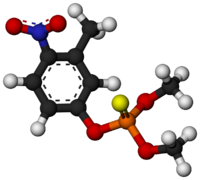杀螟硫磷
外观
(重定向自撲滅松)
此条目翻译品质不佳。 (2023年3月31日) |
本条目可能存在过多偏好某个特定立场的论点。 (2018年8月1日) |
| 杀螟硫磷 | |
|---|---|

| |

| |
| IUPAC名 O,O-Dimethyl O-(3-methyl-4-nitrophenyl) phosphorothioate O,O-二甲基-O-(3-甲基-4-硝基苯基)硫代磷酸酯 | |
| 别名 | Dimethoxy-(3-methyl-4-nitrophenoxy)thioxophosphorane O,O-Dimethyl O-4-nitro-m-tolyl phosphorothioate |
| 识别 | |
| CAS号 | 122-14-5 |
| PubChem | 31200 |
| ChemSpider | 28941 |
| SMILES |
|
| InChI |
|
| InChIKey | ZNOLGFHPUIJIMJ-UHFFFAOYAZ |
| ChEBI | 34757 |
| KEGG | C14442 |
| 性质 | |
| 化学式 | C9H12NO5PS |
| 摩尔质量 | 277.23 g·mol−1 |
| 外观 | 黄棕色液体 |
| 密度 | 1.3227 g/cm3 |
| 熔点 | 3.4 °C(277 K) |
| 沸点 | 118 °C(391 K) |
| 溶解性(水) | 38.0 mg/L |
| 溶解性 | 易溶于二氯甲烷、异丙醇、甲苯,难溶于正己烷[1] |
| log P | 3.30(辛醇/水)[2] |
| 危险性 | |
| 致死量或浓度: | |
LD50(中位剂量)
|
500 mg/kg(大鼠,口服)[3] 1416 mg/kg(雌性小鼠,口服)[4] |
| 若非注明,所有数据均出自标准状态(25 ℃,100 kPa)下。 | |
杀螟硫磷(英语:Phenitrothion)是一种价格低廉且在世界范围内广泛使用的硫代磷酸酯(有机磷酸酯)杀虫剂。[5]
健康影响
[编辑]低于致死剂量的杀螟硫磷会影响有袋动物的动作机能,[6]而在急性(高)剂量水平下,它会降低鸟类的运动活力。 [7]
在慢性(低)剂量试验中,出乎意料的是,只有最低浓度(0.011 微克/升)的杀螟松抑制了藻类的生长,尽管所使用的所有慢性剂量水平在其他方面对藻类都是有毒的。 [8]
杀螟硫磷只需要一半的最低有效剂量就可以改变淡水线鳢(鮕鲐)的甲状腺结构。 [9]
生活在杀螟硫磷喷雾操作附近的儿童的非特异性脑病和脂肪内脏变化(雷氏综合征)病例引发了后来在《科学》、[10]和最初在《柳叶刀》中描述的研究: [11]
| “ | 2日大的小鼠11日中每日服用杀螟硫磷还有其他物质。在之后2天皮下注射固定且低于致死剂量的脑心肌炎病毒 。在注入病毒后,小鼠死亡率在服用杀螟硫磷组别中死亡率为4-9%,而在服用玉米油对照组中死亡率为0%。在服用杀螟硫磷-脑心肌炎病毒组别中发现小鼠在肝脏和肾脏中脂肪出现变化。其中死亡小鼠发现其脑病变并未出现于特定中央神经系统中,但在一系列的瘫痪和惊厥后小鼠才有死亡情形。杀螟硫磷-脑心肌炎病毒组合对于人类病毒易感性的潜在接触角色需要更多关注。 | ” |
进一步的研究表明,这种疾病不是由杀螟硫磷本身引起的,而是包括表面活性剂和溶剂(有或没有杀虫剂)在内的组合清楚地表明,用这些化学物质进行预处理显着增加了试验小鼠的病毒致死率。[12]
昆虫对其的抗药性
[编辑]在一个不寻常的对杀虫剂抗性的证明中,农田中 8% 的昆虫被发现携带一种可以代谢和解毒杀螟松的共生肠道微生物;经过体外试验表明,该微生物显着提高了杀螟硫磷处理的昆虫的存活率。 [13]
参考资料
[编辑]- ^ Farm Chemicals Handbook. Willoughby, OH: Meister Publishing Co. 1999: 177. ISBN 978-1-892829-02-3. OCLC 50201739.
- ^ Hansch C, Leo A, Hoekman D. Exploring QSAR - Hydrophobic, Electronic, and Steric Constants.. Washington, DC: American Chemical Society. 1995: 60. ISBN 978-0-8412-2993-8. OCLC 924843801.
- ^ Eckroth D, Grayson M, Kirk RE, Othmer DF. Kirk-Othmer Encyclopedia of Chemical Technology. 3 3rd. New York, NY: John Wiley and Sons. 1981: 440. ISBN 978-0-471-02066-0. OCLC 873939596.
- ^ Sekizawa J, Eto M, Miyamoto J, Matsuo M. Environ Health Criteria 133: Fenitrothion (报告). Geneva: World Health Organization: 70. 1992 [2022-10-28]. (原始内容存档于2022-10-28).
- ^ 杀螟松 | 122-14-5. www.chemicalbook.com. [2022-10-28]. (原始内容存档于2022-10-28).
- ^ Buttemer WA, Story PG, Fildes KJ, Baudinette RV, Astheimer LB. Fenitrothion, an organophosphate, affects running endurance but not aerobic capacity in fat-tailed dunnarts (Sminthopsis crassicaudata). Chemosphere. July 2008, 72 (9): 1315–20. Bibcode:2008Chmsp..72.1315B. PMID 18547601. doi:10.1016/j.chemosphere.2008.04.054.
- ^ Kitulagodage M, Isanhart J, Buttemer WA, Hooper MJ, Astheimer LB. Fipronil toxicity in northern bobwhite quail Colinus virginianus: reduced feeding behaviour and sulfone metabolite formation. Chemosphere. April 2011, 83 (4): 524–30. Bibcode:2011Chmsp..83..524K. PMID 21227481. doi:10.1016/j.chemosphere.2010.12.057.
- ^ Ferrando MD, Sancho E, Andreu-Moliner E. Chronic toxicity of fenitrothion to an algae (Nannochloris oculata), a rotifer (Brachionus calyciflorus), and the cladoceran (Daphnia magna). Ecotoxicology and Environmental Safety. November 1996, 35 (2): 112–20. PMID 8950533. doi:10.1006/eesa.1996.0090.
- ^ Saxena PK, Mani K. Effect of safe concentrations of some pesticides on thyroid in the freshwater murrel, Channa punctatus: a histopathological study. Environmental Pollution. 1988, 55 (2): 97–105. PMID 15092506. doi:10.1016/0269-7491(88)90121-2.
- ^ Crocker JF, Ozere RL, Safe SH, Digout SC, Rozee KR, Hutzinger O. Lethal interaction of ubiquitous insecticide carriers with virus. Science. June 1976, 192 (4246): 1351–3. Bibcode:1976Sci...192.1351C. PMID 179146. doi:10.1126/science.179146.
- ^ Crocker JF, Rozee KR, Ozere RL, Digout SC, Hutzinger O. Insecticide and viral interaction as a cause of fatty visceral changes and encephalopathy in the mouse. Lancet. July 1974, 2 (7871): 22–4. PMID 4134409. doi:10.1016/S0140-6736(74)91351-8.
- ^ Safe S, Plugge H, Crocker JF. Analysis of an aromatic solvent used in a forest spray program. Chemosphere. 1977, 6 (10): 641–651. Bibcode:1977Chmsp...6..641S. doi:10.1016/0045-6535(77)90075-3.
- ^ Kikuchi Y, Hayatsu M, Hosokawa T, Nagayama A, Tago K, Fukatsu T. Symbiont-mediated insecticide resistance. Proceedings of the National Academy of Sciences of the United States of America. May 2012, 109 (22): 8618–22. Bibcode:2012PNAS..109.8618K. PMC 3365206
 . PMID 22529384. doi:10.1073/pnas.1200231109
. PMID 22529384. doi:10.1073/pnas.1200231109  .
.
